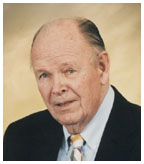Have an opinion about this issue of PAW? Please take a minute to click here and fill out our online questionnaire. It’s an easy way to let the editors know what you like and dislike, and how you think PAW might do better. (All responses will be kept anonymous.) |
April 6, 2005: A moment with...
Photo courtesy Edward Kimmel ‘42 |
Edward Kimmel ’42
Following the Japanese attack on Pearl Harbor on Dec. 7, 1941, an investigation found Adm. Husband Kimmel and Lt. Gen. Walter Short, the Navy and Army commanders on the island, guilty of dereliction of duty for having been inadequately prepared. The two were forced into retirement and stripped of their ranks. Although subsequent investigations revealed that Kimmel and Short had not been given decoded Japanese messages indicating that an attack was imminent, both men died in disgrace. For almost 20 years, Kimmel’s son, Edward Kimmel ’42, has been waging an effort to clear his father’s name. He recently spoke to PAW’s Mark F. Bernstein ’83.
Your father died in 1968. Why are you pursuing this now?
My effort has been to restore the honor and reputation of my father. He was a spit-and-polish naval officer. His integrity was beyond question. I want to make sure the world remembers him that way.
Are you succeeding?
In 2000, I got Congress to add a provision to the Defense Reauthorization Act that said my father and Gen. Short had performed their duties competently and requested that the president restore them to their highest ranks. When I got that bill passed, I thought I had it made. But even though President Clinton signed the legislation, he failed to honor the request. Since Bush came in, I’ve been trying to persuade him to do the same thing and I’ve run into a stone wall. The Defense Department takes the position that there is nothing new that would justify overturning a decision made more than 50 years ago. But I feel that legislation enacted by Congress and signed by President Clinton is tantamount to exoneration.
Do you have all the information that you need about the attacks?
An enlisted man who served in the Navy with my father made a Freedom of Information Act request, but the Defense Department denied us 66 pages of documents, of which 26 remain classified to this day. Frankly, I think the government is embarrassed by what it has done and it will not permit all the information to come out.
What did your father do after his retirement?
My father thought he would be reassigned to some other duty, but they hung him out to dry. He got a job with an engineering firm until the end of the war. He didn’t learn until 1944 that the warning messages had not been sent to him. Until that point, my father had thought he had simply been too stupid to foresee the Japanese attack. [The new information] changed his mind completely. He said, “I don’t take responsibility for anything that happened at Pearl Harbor that day.”
When did you start trying to clear your father’s name?
My brother and I didn’t get involved until 1986, when the Pearl Harbor Survivors Association passed a resolution honoring my father and Gen. Short. We said, these people are the people most affected by the Pearl Harbor disaster, and their attitudes have obviously changed. Maybe it’s time for us to see what we can do to restore our father’s honor. I got the Naval Academy Alumni Association and the VFW behind it, but no one in the Defense Department would talk to me. My son was one of [the late] Sen. Strom Thurmond’s constituents, and Thurmond held hearings in 1995 at which several people, including a former member of the Joint Chiefs of Staff, testified in support of our position. Then, in 2000, we got our resolution put into the Defense Reauthorization Act.
Given that your father was not shown the Japanese messages, do you still think he acted appropriately that day?
What was my father’s state of readiness at Pearl Harbor? Well, let me tell you, it was damned good. Although he had no idea that the Japanese fleet was already sailing for Hawaii, tensions were high and many people were worried that war might be coming. My father had issued orders that officers and enlisted men be on board their vessels to man the guns and that live ammunition be ready. The attack occurred at 7:55 a.m., and they started firing those guns immediately. When Adm. [Chester] Nimitz relieved my father in January 1942, he was convinced that the Japanese would attack Pearl Harbor again. What did he do? He put in the same security order my father had. So it’s just preposterous when people say that my father was asleep at the switch.
Where were you on Dec. 7, 1941?
I was in my room at 2 South Dod, and believe it or not, I was studying.
Some of my buddies upstairs had a radio and heard about this, and ran
down and told me about it. Naturally, I was terribly concerned. My father
was in Hawaii. My mother was in California. Both my brothers were in the
Navy, serving on submarines. And here I was, sitting in Princeton. ![]()


